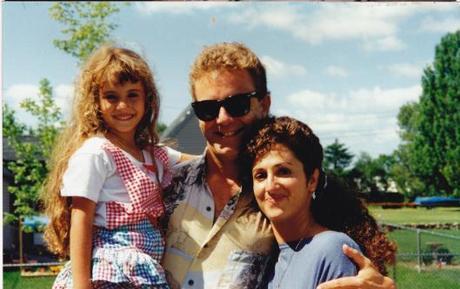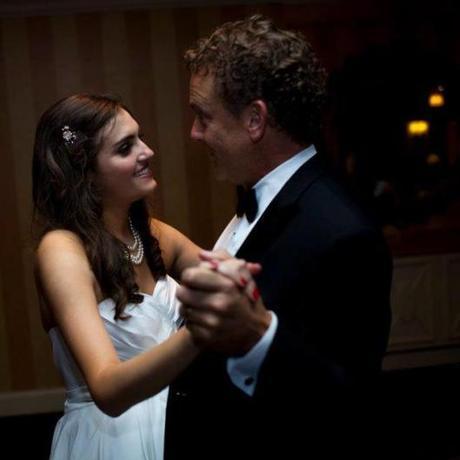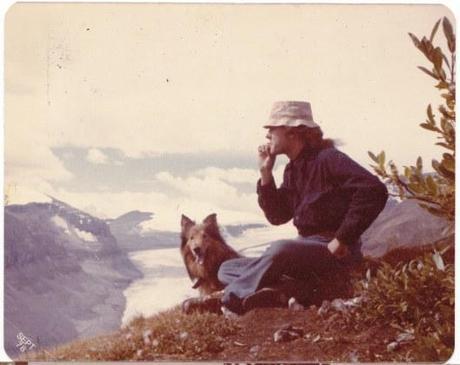Today’s post is written by someone I deeply love — my daughter-in-law Lauren. Less than 2 years after I watched her walk down the aisle on the strong arm of her father and watched the father-daughter dance on a night bathed in joy, I was at his funeral. No one expected it. It was too quick. It was too early. It wasn’t right. Lauren was too young, too newly married. But it happened and so today’s post is a tribute to her dad, Jim Robertson who died on January 8, 2013. Lauren writes this post as one who grieves to you who grieve, who are living in the gray. The post is an essay on grief, and because grief is complicated, there is no word count.
*****************

On this day, one year ago, my father died. I called our hospice nurse over early that morning. My mom and I had been up all night holding his hand. I remember singing to him. Every now and again, through such labored breathing, he’d open his eyes and struggle to ask, “Why are you guys sad? Do you know something I don’t know? Will you sing to me?” I wanted to tell him how much I loved him and how thankful I was for him. I also didn’t want to make it any harder on him, so I’d sing to him and massage his forearms – the only part of his body that looked remotely like it did before cancer.
When I would hear about cancer and death, I’d have this image in my head of someone being hooked up to all these machines and the person saying one last thing to their loved ones, then closing their eyes and drifting off peacefully. That is not what happened. We were at home, because my dad wanted it that way, and we had a female hospice nurse that would come in and check up on him. Listen, my mother is a powerhouse. I always knew it. Watching her administer morphine and all the other drugs, all while dealing with the emotional and physical stress of tending over her dying husband – I am still in awe. I am not sure exactly what happens or how the body breaks down, but I believe that since the cancer was in his lungs (and several other places) his breathing got harder and harder. A few days before, he started taking anti-anxiety pills. I wish I had known that this was the last time he’d be coherent. I would’ve tried to have just one more conversation with him – maybe about how he wouldn’t be able to meet his grandkids and how sorry I was for that. But after he started taking the anti-anxiety medicine, he started to see things and communicating became more difficult. There were a few times he saw men in the room. He smiled at them and called them “gentlemen”, like they were from the 1940s. I hope that among those gentlemen was his father, ready to take him into the next stage.
In those last hours, occasionally he’d stop breathing. Everything would stop. I’d stare at his chest waiting for it to rise, thinking how mad I’ll be that he didn’t hear me say bye. And then with force, his chest would rise. This is not something you want to see your father do. It’s not something I’ve ever seen in the movies or heard about. And the whole time I’m worrying and wondering, “is this normal”? And there is no one to tell you yes or no. In all of life, when I am hurt or when someone else is physically hurt, I search for the solution: what can I do to make this better – to fix this? But with my father, it was an awful reality to accept. He wasn’t getting better. He was moving towards death.
It was terrifying up until the last 10 minutes. The last 10 minutes, I knew exactly what needed to happen and what was happening. Not because somebody told me, but because of some intuition a daughter has with her father. He was struggling so much – we didn’t want him to be in more pain. So my mother and I removed his oxygen mask – something that seemed so wrong. And we put on his favorite album of “Yes” and the hospice nurse read a psalm from the Bible. And as soon as we made that transition, he stopped struggling. I asked, “is he gone?”; the nurse listened to his heart and said, “no, he’s still here.” And he relaxed. I held one hand, my mom held the other. He was facing her and his eyes were half-open. He tried to speak but he couldn’t, tried to open his eyes, but he couldn’t. My mother recalled all the beautiful places they had traveled together and would travel together in Heaven. In his last breath, he managed to smile at her. And I was so happy for him to not be in pain anymore. I felt the energy between his body and the heavens. I felt my mom, my dad, and I as one. And I felt his peace.
Last new years eve, I wrote the following in my journal:
“Well, my parents were able to give each other a new years kiss and my heart is melted to puddin’. So f*** you cancer. If I were to share this, I’d probably take out the f-word and say something like ‘cancer: 0, parents: 1’. But I think I like it better in my journal. Because nothing – no words – can touch the sweetness, sadness, and joy that happened when my mom leaned over onto my father’s death bed and kissed a spark – a second of life into him – and him to her – and then he pulled her back in for more kisses. Something that took all the energy he could muster up. I wonder if he stayed still the whole day so that when the time came, he would have reserved enough energy to reel his wife back in for more kisses.”

When my father died, I wasn’t ready for the little stings like shutting off his phone and not hearing his voice on his voicemail. I also wasn’t prepared to lose other people in my life, to become resentful towards people, and to grieve in isolation. Grieving for me was – and still is – so odd. Most of the time, I’m wishing to feel something one hundred percent whether it’s intense joy or intense sadness. Instead, I stay in gray confusion. I can see now that this is grief for me. But that is my grief – and I can’t speak for anyone else.
After my dad died, I found a therapist in Los Angeles right away. I told him, “I want to grieve properly.” He asked me what that meant — I still don’t know what my answer is. My main struggle was feeling inadequate. I’m a very empathetic person – and I’m very in tune with others. So when I encountered people’s inability to address my grief, I felt I wasn’t supposed to be grieving. Los Angeles is a hard place to be gray. Everyone wants you to pick up your feet and move on, or go home. People would forget and ask me why I was weird. And so I began to dislike myself, something I’ve never really experienced. I thought something was inherently wrong with me, that I was failing in every way. Why wasn’t I able to remember things I used to remember? Why was it hard for me to be around big groups of people? Why couldn’t I just stay in bed in cry or get up and live a productive life?
I’m reading a play right now where a young woman has just lost her father. At his funeral, she says, “I’m so tired of people saying ‘I’m so sorry for your loss’”: I am envious of this character. I don’t remember ever hearing those words. Was it because I looked strong? Or were family and friends just too uncomfortable to bring it up? Everyone kept asking how my mom was or commenting on how strong she was, and I understand that. She was, and is, grieving her husband. I can’t even imagine. But why didn’t anyone ask me how I was doing? That pattern continued for the year. I’d get texts from people asking how my mom was and telling me to take care of her, that I needed to stay strong for her. I guess I began to believe subconsciously that her pain was far greater and more legitimate than mine; and in the process, I forgot about me.
If you are in the gray right now, I want to speak to you. You are still you. Your pain is not made invalid through others’ lack of acknowledgment. Your confusion and grayness is right. What people and books tell you about how you should be feeling – don’t let it be your compass for normal. My hope for you is to embrace your gray and let go of the struggle to achieve feeling and clarity. C.S. Lewis once said, “You are not a body who has a soul. You are a soul who has a body.” You are a soul who is learning how to cope with your new surroundings. But you are still you.
An author who I relate to most during all of this is Elizabeth Lesser. Here is an excerpt from her book Broken Open that I found to be powerful in my grief:
“When I noticed someone teetering near the edge I would pray for her to walk around the abyss. Now I pray for something different. I pray that each one of us stays awake as we fall. That we choose to go into the abyss willingly and that our fall is cushioned by faith – faith that at the bottom, we will be caught and taught and turned toward the light. I pray that we don’t waste precious energy feeling ashamed of our mistakes or embarrassed by our flaws. After years of teaching, I know only a few things for sure. One is this: we are chunks of dense matter that need to be cracked open. Our errors and feelings are chinks in the heart’s armor through which our true colors can shine.”
On the day of the funeral – we had 17 family members staying in our house. And as everyone was getting ready and laughing and eating I remember thinking, “how can life possibly be continuing without my dad.” I went into my parents’ room and for the first time since everyone arrived, I let myself cry. My cousin Adrienne laid beside me and just let me cry on her sweater. I can’t tell you how meaningful that was. For those of you who have a family member or friend who is experiencing loss, and you are unsure about how to help – my advice to you is to just sit and listen. So many times, I just wanted someone to acknowledge my pain. To just sit with me in my sadness. Thank you to those who did that with me. And thank you to my husband who was so patient with me, who would do crazy things in public to make me laugh and who would not question me when I shut down.
My father was a unique and beloved man. He always brought the fun. At my wedding, his speech was him singing, “I gotta feeling that tonight’s gonna be a good night” and he got all the guests out of their chairs clapping and singing. You can tell a lot about someone’s character by the way they handle death. He was strong and calm throughout it all. He said he had so many “’take me now’ moments” during his life that he was ready for what was next. During his brief stage of chemotherapy, I texted him once to ask how he was doing; he texted back, “Getting chemo. Wishing I was on top of a mountain.” And on this day – even though I’d much rather have him here next to me – I can smile and think he probably got his wish.

About the Author: Lauren Robertson Gardner is an actor living in Los Angeles with her husband, Micah Gardner and arguably the cutest dog in the world — Wilbur. She is in two regularly featured shows at iO West – LA’s Best Improv Comedy and has been featured in several short films including Running Buddies, Role Play, and Santa is Real.


